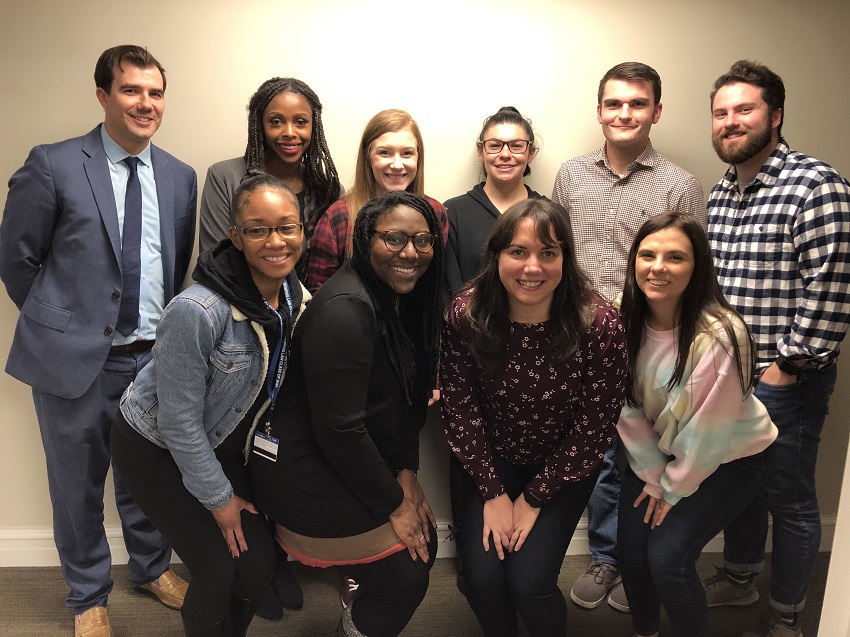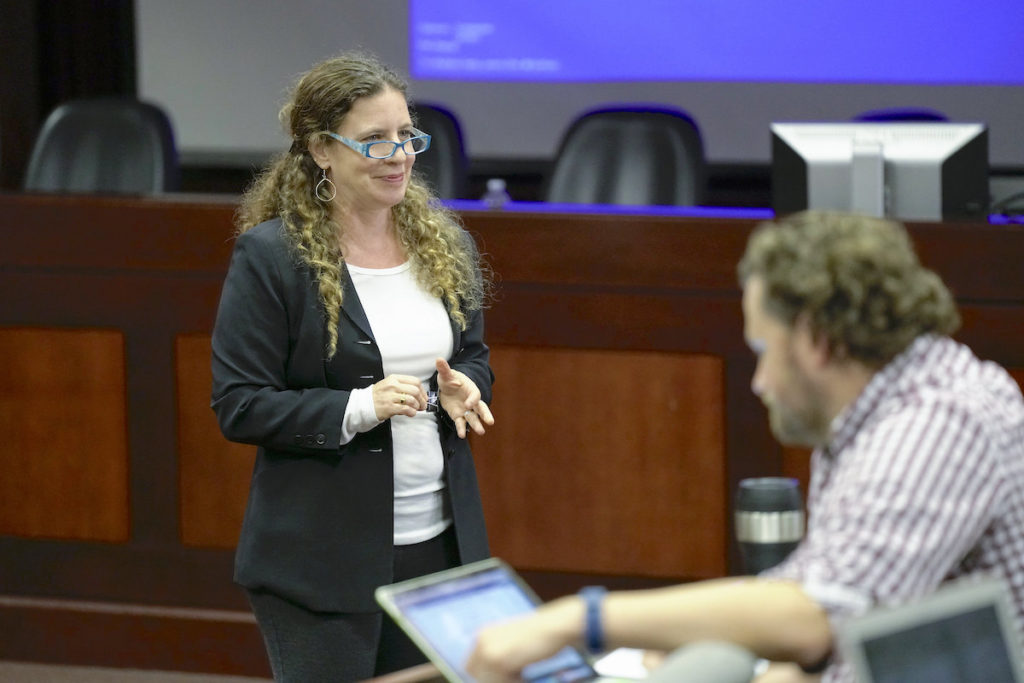School of Law
Clinic Students Pivot Amidst Pandemic

When colleges and universities across the state announced the cancellation of in-person classes due to the COVID-19 pandemic, law professors and students were scrambling to find out how their classes would continue this semester.
Perhaps none more-so than those involved in Memphis Law's Medical-Legal Partnership (MLP) Clinic at Le Bonheur Children's Hospital, since continuing to carry out any work in the on-site legal clinic at the hospital would be out of the question. Not only was the work currently being done with patients now put on hold, but all future cases at Le Bonheur were going to be put off for the rest of the semester.

Professor Katy Ramsey, director of the MLP Clinic, wanted to find a meaningful way to help her students take on a health-related response directly tied to this health crisis.
"I had recently been a part of several conversations about what other states and local jurisdictions were doing with regards to evictions," Ramsey said. "There had started to be a trend of governors, mayors, and local leaders imposing moratoriums on evictions while this crisis is ongoing."
"We're looking at both a health crisis and an economic crisis here," she said. "In an economic crisis, people are less likely to be able to pay their bills and rent. We've been told that the remedy to this health crisis is to stay at home. So, it's very inconsistent to think that we could both be allowing numerous evictions to proceed, which ultimately results in higher degrees of homelessness, while also asking people to stay at home and socially isolate."
"When staying home is the only way to curb the spread of coronavirus," Ramsey said. "We cannot allow people to be removed from the zone of safety that is the home."
Unhoused populations are already at greater risk of contracting infectious diseases.
People living in shelters, on the streets, and doubled up with family members and
friends are less capable of engaging in the social distancing, handwashing, and other
infection-preventing practices that the CDC and elected officials are recommending
to try to contain the coronavirus outbreak.
In short, the higher numbers of evictions were going to result in higher rates of
COVID-19 cases. These eviction and foreclosure legal proceedings had to be halted
in order to protect vulnerable citizens during this pandemic and mitigate further
community transmission.
Ramsey started reaching out to legal aid organizations and fellow practitioners across the state and her research eventually led her to the University of Tennessee College of Law and Professor Wendy Bach, who teaches the Advocacy Clinic at UTK Law.
"I was looking for something meaningful for our students to take on that was a direct response to this crisis," Bach said. "Legal services attorneys are facing a wave of eviction-related work. There is a moratorium on eviction proceedings now. But when that's lifted, the number people dealing with these situations will skyrocket. And the proceedings will move very fast."
"Wendy and I have known each other through national organizations and scholastic circles for a number of years," Ramsey said. "When we began talking with each other about the projects we were considering, we realized that we both had the same boss at the Legal Aid Society in New York. We worked there at different times, but for the same person."

The two professors began to think about how their cross-state clinics and students could work together on the problem. In doing so, they realized that their actual, in-person clinic classes were scheduled on the same exact date and time, which meant they could combine their efforts and bring all of their students together virtually – using Zoom sessions – to find answers to our state's larger eviction issues related to the COVID-19 crisis.
"Tennessee does not have strong tenant protection laws, so evictions are always a problem and tenants don't have lot of recourse," Ramsey said.
When landlords are hindered from evicting tenants, it's not unusual to see those landlords change locks, cut off utilities or even remove front doors from their tenants' dwellings, Ramsey said, "and that's absolutely illegal."
The overall course morphed into a sort of three-part project around evictions. A statewide survey project; the drafting of model pleadings for attorneys to use as templates; and a communications group that researched policy, drafted recommendations for change, wrote op-ed pieces for local newspapers, as well as put together FAQ and "Know Your Rights" documents for those in need, both attorneys and tenants.
County courts have discretion about whether they will accept eviction filings during this time, and sheriffs can interpret how they want to proceed with executing writs that were issued prior to court closures throughout the state. So, the clinics brought on a third partner in the Tennessee Alliance for Legal Services (TALS) to tackle the survey portion of the project.
"Wendy and I had already been doing a lot of research on whether the sheriff's offices in Shelby and Knox counties were still executing writs of eviction prior to the Court's closing; if some process servers were still issuing filings in some parts of the state; and if Clerk's offices were still accepting filings and calendaring them for the future," said Ramsey. "So, when we were talking with TALS and told them we had this information for our respective counties, they told us it would be wonderful if they had that information for the entire state."
Students in the two classes developed a set of standardized questions and called sheriff's offices, general sessions courts, and court clerks offices in the 95 counties across the state of Tennessee, where they asked these questions in order to determine how evictions were being handled in each county.
"The information was important for TALS to have when they receive calls their helpline," UT Professor Bach said. "They wanted to be able to accurately answer questions for clients about how to best deal with situations in their home counties."
Secondly, the students undertook a "pleadings" portion of the project where they drafted model pleadings and model answers for attorneys to use as templates in these eviction cases.
"We heard from several legal aid attorneys that they used these pleadings immediately and prevented evictions based on the research that the students did, which was really awesome," said Professor Ramsey.
The model answers were drafted in anticipation of the flood of eviction filings that occur when courts reopen.
"We wanted to give legal aid attorneys around the state, as well as possibly pro se tenants, a template that listed out legitimate defenses and counter-claims, that they would have immediate access to that they might not normally have the time or resources to put together," noted Ramsey.
Students in the Communications section of the project took a more public-facing approach to the problem. These students researched policy issues and eviction laws in relation to public health emergencies and then drafted opinion pieces for local news outlets detailing why people should care about eviction issues and why there ought to be a longer moratorium on evictions during this crisis. Additionally, these clinic students spent time crafting "Know Your Rights" and FAQ informational pieces for tenants to help them know what to expect when going through this process.
Memphis Law student Heather Bornstein is President of the law school's Health Law Society and was a student in this innovative new evolution of the MLP Clinic. She and her partner at UT, Allen Heaston, researched past pandemics like the Spanish Flu, where these sorts of policies were not implemented, and the results were drastically dire.
"Because there is no precedent from any state on eviction moratoriums, it was really difficult to understand the effects of having one," Bornstein said. "What we do know is NOT having one has disastrous effects."
"We looked into what happened during the Spanish Flu pandemic in 1918, and if what happened then carries over to today, we're about to have a significant housing crisis," Tennessee College of Law student Allen Heaston said.
All of this fast-moving change as a result of the effects of COVID-19 could have torpedoed the learning of some students and their classes. But those in this unique adaptation found the experience enlightening and fruitful.
"I've learned so much from having the opportunity to continue our clinic work remotely," said Memphis Law student and clinic participant Rose Logan. "Zealous advocacy includes being prepared, flexible and innovative and being a student-attorney during this crisis has empowered me to think outside of the box to remain diligent about my future casework and clients."
Bornstein's partner at UT said learning about housing law through the Legal Clinic
was a worthwhile experience.
"It was just a very different area of study for me," Heaston said. "Just the vast
amount of knowledge we were able to absorb in a short period of time has been incredible."
COVID-19 is not going entirely away any time soon, and the related crisis associated with evictions and public health will be impacted by the way the courts and legal system react and plan for its impact. Accordingly, the work this partnership produced will be of great benefit even beyond this immediate summer, and the professors and teachers agree that it was wonderful for everyone involved to work on a project like this, even though it was necessitated by a less than ideal scenario.
"This pandemic and studying the current legal policy in place has shown me what real difficulties these individuals deal with and the unfairness of it all," Bornstein said. "I plan to utilize all these skills when I graduate law school, as patience, emotional connection, and adaptability are key traits that a successful trial lawyer needs."
"This was obviously very different work than our students anticipated at the beginning of the semester," Ramsey said. "But it was also very impactful and real work. The feedback we've gotten so far has been great and Professor Bach and I hope this collaboration can continue."
